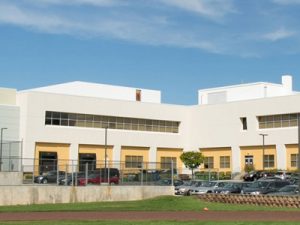History Electives Description
Elective Offerings: 11th or 12th Grade
AP Art History
The Advanced Placement Art History course gives eleventh and twelfth graders the foundation needed to study and discuss art from all over the world, from prehistoric times to today. This art history course includes the study of architecture, sculpture, the pictorial arts – painting, drawing, printmaking and photography – and the craft arts. The AP course offers a sweeping survey of the handicrafts of mankind from ancient civilizations to the modern world. It engages students at the same level as an introductory college art history course, developing students’ skills in visual, contextual and comparative analyses. The course demands considerable reading outside of class and essay writing.
AP US Government and Politics
AP United States Government and Politics introduces students to key political ideas, institutions, policies, interactions, roles and behaviors that characterize the political culture of the United States. The course examines politically significant concepts and themes, through which students learn to apply disciplinary reasoning, assess causes and consequences of political events, and interpret data to develop evidence-based arguments.
12th Grade Elective Offerings
History and Memory: The Holocaust
This course examines the history of antisemitism with a focus on the Holocaust and racism. Students will investigate the development and implementation of racial antisemitism in Germany and compare Nazi antisemitism with other forms of racism and antisemitism in Europe and America. In addition, students will also explore the social construction of race, the connection between antisemitism and anti-Zionism, the growth of neo-Nazism and racism in the world today.
History of New York City
New York is one of the most important and influential cities in the world. In this course students will discover how a small island on America’s east coast became such a dominant metropolis. The first half of the course will cover the history of the city, while the second half will take a thematic approach which will include architecture, politics, and immigration.
Representing the Past: Historiography and Historical Methods
Historiography is not the study of history itself, but of the writings about history. It is an analysis of how historians have analyzed the past. It asks questions like, is there a pattern to how the past is written about? Can we learn anything about the past by looking at how it has been written about? Are there techniques and methods for studying the past? In this class students will examine and discuss how historians, beginning in the late middle ages and through the twenty-first century, have analyzed the past, paying special attention to their methods and techniques. Theories and methods of historical thinking that will be discussed include postmodernism, deconstruction, the Marxist critique, the Feminist critique, ideology and history, religion in history, history and nationalism, economic history, the Annales school, Holocaust and genocide, and others. We will also discuss the use of primary source materials and the mechanics of how professional historians do their job.
Themes in World History
This honors level course covers all of human history from the dawn of man until the
21st century. We will take a thematic approach to history, focusing on 5 different topics: mankind’s evolving relationship with the environment, the development and interaction of cultures, the forming of and conflicts between states, the creation and interaction of economic systems, and the development and transformation of social structures
American Jewish History
In 1654, 23 Jews settled in New Amsterdam. Over the next 350 years, Jews have learned to adapt to life in the New World. In this class students will take a chronological survey through Jewish history while taking some thematic detours to look into the development of different Jewish groups, the evolution of the American synagogue, and the surprising geography of Jewish America.
The History of American Freedom
America was founded on ideas and ideals of freedom and liberty, but what do these ideas actually mean? We will discuss the great decisions of the Supreme Court through the generations. We will explore cases such as Marbury v. Madison (that created the ability of the Supreme Court to declare laws unconstitutional), or Dred Scott v. Sandford (that denied citizenship from slaves and Native Americans, or Brown v. Board of Education that abolished the doctrine of “Separate but Equal”). Bringing these discussions to the present day, we will examine such pressing issues as the right to free speech, freedom of religion and from religion, abortion as a right of privacy, and the relationship between Federal government and the states. This course promises to provide students with a rich legal-historical background that will serve them well as educated citizens and future leaders.
The Modern Jewish Experience: 18th Century Movements to 21st century Israel Advocacy
This course will survey modern Jewish history from the French Revolution to the present day. In particular this course will chart the ways the modern Jewish experience, beginning in the eighteenth century, has shaped the varying and often competing narratives of Zionism and Zionist thought and broader developments leading to the creation of the State of Israel. In this regard significant attention will be paid to understanding, unpacking, and analyzing the variegated arguments made in support of and against the State of Israel in order to proffer a more robust defense against common criticism made of the State. Major developments are analyzed in light of political, social, and ideological currents and trends. Emphasis is placed upon the emergence of diverse expressions of Jewish religious and secular identity. Topics include: the Enlightenment and emancipation; rise of Reform Judaism; the Positive-Historical School: Neo-Orthodoxy; Haskalah; Volozhin and the Yeshiva movement; Mussar movement; Jewish socialism; political and racial anti-Semitism; migrations; Hibbat Zion and Zionism.
The History of Terrorism
A survey of mankind’s willingness to use violence as a means to affect politics. In this course, students will learn about individuals and entities associated with terrorism throughout history. In particular, but not exclusively, students will explore the origins, objectives and methods of groups such as the PLO, IRA, Hamas, Al Qaeda and ISIS. We will also discuss what constitutes terrorism, as “one man’s terrorist is another man’s freedom fighter.”
Constructing the History of Tomorrow
The focus of this class is not to study themes, narratives, and details of past events, peoples, or places. Rather the goal of this class is to look at our contemporary world with all of its flaws and problems and to try to envision what is actually possible for the future, what changes can be made and what problems can be solved to create a more judicious, hospitable world for all of its inhabitants. In this class students will work to understand and solve a single problem, a major issue that impacts millions of people on a daily basis- that problem may be how to ensure safe drinking water or how to stem the tide of human trafficking or how to solve homelessness or food shortage. As a class the group will decide what problem to solve and during the first half of the year we will study that problem from all angles – political, economic, social, cultural, and historical. During the second half of the course students will work to devise and create ways to solve the problem, workshopping their solutions along the way in order to gain valuable feedback from classmates. Students will then present our solutions to a group of experts who can help guide in the implementation of these solutions. Our goal is think about how we can shape the future, how we can change the world for the better, and how we can construct the history of tomorrow.





